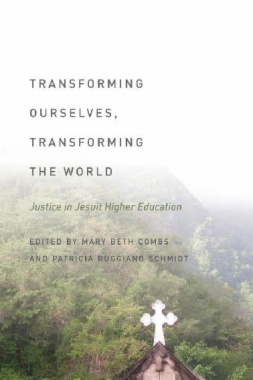

Transforming Ourselves, Transforming the World is an insightful collection that articulates how Jesuit colleges and universities create an educational community energized to transform the lives of its students, faculty, and administrators and to equip them to transform a broken world. The essays are rooted in Pedro Arrupe’s ideal of forming men and women for others and inspired by Peter-Hans Kolvenbach’s October 2000 address at Santa Clara in which he identified three areas where the promotion of justice may be manifested in our institutions: formation and learning, research and teaching, and our way of proceeding.
Using the three areas laid out in Fr. Kolvenbach’s address as its organizing structure, this stimulating volume addresses the following challenges: How do we promote student life experiences and service? How does interdisciplinary collaborative research promote teaching and reflection? How do our institutions exemplify justice in their daily practices? Introductory pieces by internationally acclaimed authors such as Rev. Dean Brackley, S.J.; David J. O’Brien; Lisa Sowle Cahill; and Rev. Stephen A. Privett, S.J., pave the way for a range of smart and highly creative essays that illustrate and honor the scholarship, teaching, and service that have developed out of a commitment to the ideals of Jesuit higher education. The topics covered span disciplines and fields from the arts to engineering, from nursing to political science and law. The essays offer numerous examples of engaged pedagogy, which as Rev. Brackley points out fits squarely with Jesuit pedagogy: insertion programs, community-based learning, study abroad, internships, clinical placements, and other forms of interacting with the poor and with cultures other than our own. This book not only illustrates the dynamic growth of Jesuit education but critically identifies key challenges for educators, such as: How can we better address issues of race in our teaching and learning? Are we educating in nonviolence? How can we make the college or university “greener”? How can we evoke a desire for the faith that does justice?
Transforming Ourselves, Transforming the World is an indispensable volume that has the potential to act as an academic facilitator for the promotion of justice within not only Jesuit schools but all schools of higher education.